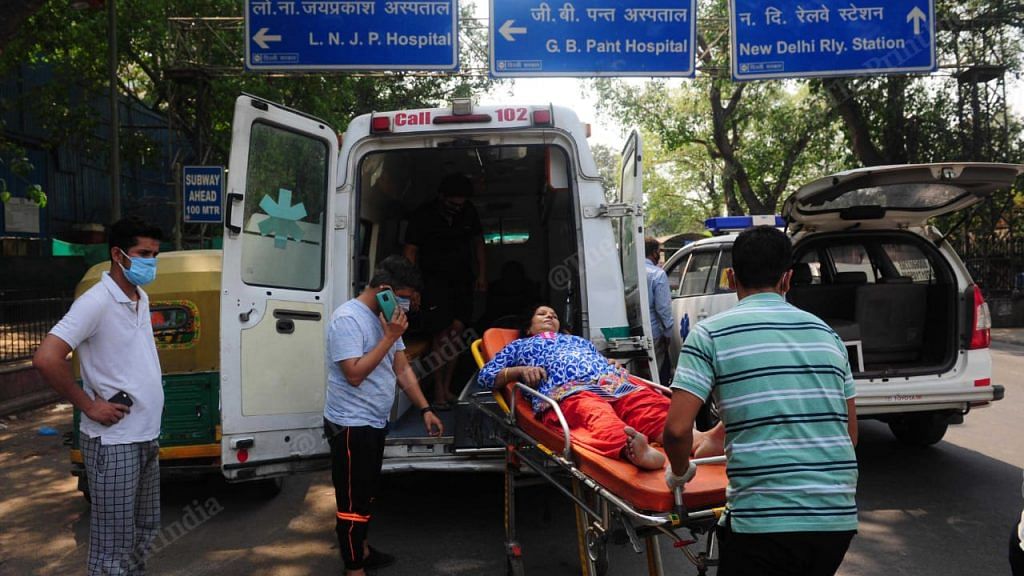New Delhi: India faces shortages of the two monoclonal antibody therapies — Itolizumab and Tocilizumab.
In a healthy body, the immune system is able to create antibodies — tiny Y-shaped proteins in our blood that recognise microbial enemies and bind to them, signalling the immune system to then launch an attack on the pathogen.
However, for people whose immune systems are unable to make sufficient amounts of these antibodies, scientists provide a helping hand.
Monoclonal antibodies are artificially created antibodies that aim to aid the body’s natural immune system. They target a specific antigen — a protein from the pathogen that induces immune response.
Monoclonal antibodies can be created in the lab by exposing white blood cells to a particular antigen. In the case of Covid-19, scientists usually work with the spike protein of the SARS-CoV-2 virus, which facilitates the entry of the virus into the host cell.
To increase the quantity of antibodies produced, a single white blood cell is cloned, which in turn is used to create identical copies of the antibodies.
ThePrint looks at the various monoclonal antibody therapies developed worldwide.
Also read: ZyCoV-D, the made-in-India Covid vaccine by Zydus Cadila, likely to hit markets in June
History
The idea of delivering antibodies to treat a disease dates as far back as the 1900s, when Nobel-prize winning German immunologist Paul Ehrlich proposed the idea of a ‘Zauberkugel‘ (magic bullet), a compound which selectively targets a pathogen.
From then, it took eight decades of research to finally arrive at Muromonab-CD3, the world’s first monoclonal antibody to be approved for clinical use in humans. Muromonab-CD3 is an immunosuppressant drug given to reduce acute rejection in patients with organ transplants.
Ebola and HIV
Monoclonal antibodies are now relatively common. In fact, the first approved treatment for the Ebola viral infection was a cocktail of three monoclonal antibodies.
Monoclonal antibodies are also used to treat HIV, and are especially useful against the drug-resistant virus.
Covid-19
In the context of the current pandemic, monoclonal antibodies gained widespread attention after former US President Donald Trump was treated with Regeneron in October last year. The drug was still in the experimental stage at the time.
There are now several approved monoclonal antibody therapies that have been developed around the world for Covid-19.
Itolizumab
Bengaluru-based biopharma company Biocon developed itolizumab as a treatment for skin ailment called psoriasis. The Drugs Controller General of India had authorised it for “restricted emergency use” in the country in June 2020.
Instead of targeting an antigen, itolizumab targets CD6, a protein found in the outer membrane of a T-cell. T-cell is a type of white blood cell that plays a central role in the body’s immune response.
While protein CD6 is important for the continued activity of T-cells when the body encounters a foreign pathogen, in case of severe Covid-19, the immune system goes into an overdrive — a process known as a cytokine storm — causing inflammation and organ damage.
Itolizumab, by binding to CD6, tones down T-cell activation and causes reduction in synthesis of pro-inflammatory cytokines.
Bamlanivimab and etesevimab
In February this year, the US FDA authorised the emergency use of the combination bamlanivimab and etesevimab, a monoclonal antibody cocktail developed by US-based pharmaceutical Eli Lilly and Company.
Both the antibodies target the spike protein of the SARS-CoV-2 virus.
The company says that a combination of bamlanivimab and etesevimab reduced the risk of hospitalisations and death by 87 per cent in Covid-19 patients with mild-to-moderate symptoms.
Also read: Here is an early warning system for the next surge of coronavirus variants
Casirivimab and imdevimab
US-based biotechnology company Regeneron Pharmaceuticals developed a drug called REGN-COV2, which is a cocktail of two antibodies — casirivimab and imdevimab.
Both antibodies target different regions of the spike protein of the virus.
The drug was given emergency use authorisation by the US FDA in November last year.
The drug is meant for use in mild-to-moderate Covid-19 patients who are not on oxygen support, but who may be at risk of severe disease.
According to phase 3 clinical trial data, the therapy reduces the risk of Covid-19 hospitalisations and death by 70 per cent in people with mild-to-moderate symptoms.
Levilimab
The Russian biotechnology company BIOCAD developed the antibody levilimab (Ilsira) to treat rheumatoid arthritis. It received approval by the country’s Ministry of Health for Covid-19 treatment on 5 June last year.
The antibody targets IL-6, a molecule that causes cytokine storm-related complications in severe Covid.
Tocilizumab
This monoclonal antibody has approval from the FDA to treat rheumatologic disorders. This antibody too inhibits IL-6 activity, and hence was proposed as a potential therapy for severe Covid.
Tocilizumab does not yet have authorisation from the FDA for Covid-19. However, the US National Institutes of Health recommends it for hospitalised Covid-19 patients on the condition that healthcare professionals use them in conjunction with other treatments.
The drug is currently approved for off-label use in India, which means clinicians can prescribe these drugs after informed consent of patients.
Results from a recent clinical trial in India, published in The Lancet journal, found that routine use of tocilizumab in patients admitted to a hospital with moderate to severe Covid-19 is not helpful. The study suggests that tocilizumab may still be effective in patients with severe Covid-19, but it needs to be further investigated.
(Edited by Manasa Mohan)
Also read: Coronavirus variant in India – what is it and what effect will it have?
